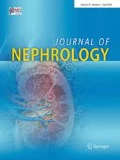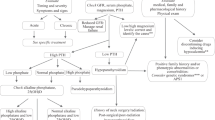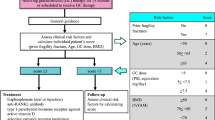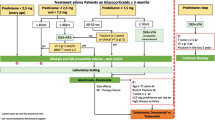Abstract
Renal osteodystrophy (ROD), the histologic bone lesions of chronic kidney disease (CKD), is now included in a wider syndrome with laboratory abnormalities of mineral metabolism and extra-skeletal calcifications or CKD-mineral and bone disorders (CKD-MBD), to highlight the increased burden of mortality. Aging people, frequently identified as early CKD, could suffer from either the classical age-related osteoporosis (OP) or ROD. Distinguishing between these two bone diseases may not be easy without bone biopsy. In any case, besides classical therapies for ROD, nephrologists are now challenged by the possibility of using new drugs developed for OP. Importantly, while therapies for ROD mostly aim at controlling parathyroid secretion with bone effects regarded as indirect, new drugs for OP directly modulate bone cells activity. Thus, their action could be useful in specific types of ROD. Parathyroid hormone therapy, which is anabolic in OP, could be useful in renal patients with low turnover bone disease. Denosumab, the monoclonal antibody against receptor activator of NF-κB ligand (RANK-L) that inhibits osteoclast activity and proliferation, could be beneficial in cases with high turnover bone. Use of romosozumab, the monoclonal antibody against sclerostin, which both stimulates osteoblasts and inhibits osteoclasts, could allow both anabolic and anti-resorptive effects. However, we should not forget the systemic role now attributed to CKD-MBD. In fact, therapies targeting bone cells activity could also result in unpredicted extra-bone effects and affect cardiovascular outcomes. In conclusion, the new biologicals established for OP could be useful in renal patients with either OP or ROD. In addition, their potential non-bone effects warrant investigation.




Similar content being viewed by others
References
Eckardt K-U, Kasiske BL (2009) KDIGO clinical practice guideline for the diagnosis, evaluation, prevention, and treatment of Chronic Kidney Disease-Mineral and Bone Disorder (CKD-MBD). Kidney Int 76:S1–S2
Cozzolino M, Pasquali M (2015) Where is the link between mineral bone markers and cardiovascular disease in CKD? Clin Kidney J 8:729–731
Moe S, Drüeke T, Block GA et al (2009) KDIGO clinical practice guideline for the diagnosis, evaluation, prevention, and treatment of chronic kidney disease -mineral and bone disorder (CKD-MBD). Kidney Int 76:S3–S130
Moe S, Drüeke T, Cunningham J, Goodman W, Martin K, Olgaard K et al (2006) Definition, evaluation, and classification of renal osteodystrophy: a position statement from Kidney Disease: Improving Global Outcomes (KDIGO). Kidney Int 69:1945–1953
Mazzaferro S, Tartaglione L, Rotondi S, Bover J, Goldsmith D, Pasquali M (2014) News on Biomarkers in CKD-MBD. Semin Nephrol 34:598–611
NIH Consensus Development Panel on Osteoporosis Prevention, Diagnosis, and Therapy (2001) Osteoporosis prevention, diagnosis, and therapy. JAMA 285(6):785–795
Miller PD (2009) Diagnosis and treatment of osteoporosis in chronic renal disease. Semin Nephrol 29:144–155
West SL, Lok CE, Langsetmo L, Cheung AM, Szabo E, Pearce D et al (2015) Bone mineral density predicts fractures in chronic kidney disease. J Bone Miner Res 30:913–919
Kazama JJ, Iwasaki Y, Fukagawa M (2013) Uremic osteoporosis. Kidney Int Suppl 3:446–450
Rotondi S, Pasquali M, Tartaglione L, Muci ML, Mandanici G, Leonangeli C et al (2015) Soluble α -Klotho serum levels in chronic kidney disease. Int J Endocrinol 2015:1–8
Mazzaferro S, Pasquali M, Pirrò G, Rotondi S, Tartaglione L (2010) The bone and the kidney. ArchBiochem Biophys 503:95–102
Lane NE, Parimi N, Corr M et al (2013) Association of serum fibroblast growth factor 23 (FGF23) and incident fractures in older men: the Osteoporotic Fractures in Men (MrOS) study. J Bone Miner Res 28:2325–2332
Yenchek RH, Ix JH, Shlipak MG, Bauer DC, Rianon NJ, Kritchevsky SB et al (2012) Bone mineral density and fracture risk in older individuals with CKD. Clin J Am Soc Nephrol 7:1130–1136
Suda T, Takahashi N, Udagawa N, Jimi E, Gillespie MT, Martin TJ (1999) Modulation of osteoclast differentiation and function by the new members of the tumor necrosis factor receptor and ligand families. Endocr Rev 20:345–357
Pixley FJ, Stanley ER (2004) CSF-1 regulation of the wandering macrophage: complexity in action. Trends Cell Biol 14:628–638
Teitelbaum SL (2000) Bone resorption by osteoclasts. Science 289:1504–1508
Li X, Zhang Y, Kang H, Liu W, Liu P, Zhang J et al (2005) Sclerostin binds to LRP5/6 and antagonizes canonical Wnt signaling. J Biol Chem 280:19883–19887
Maierhofer WJ, Lemann J, Gray RW, Cheung HS. (1984) Dietary calcium and serum 1,25-(OH)2-vitamin D concentrations as determinants of calcium balance in healthy men. Kidney Int 26:752–9
Udagawa N, Takahashi N, Akatsu T, Tanaka H, Sasaki T, Nishihara T et al (1990) Origin of osteoclasts: mature monocytes and macrophages are capable of differentiating into osteoclasts under a suitable microenvironment prepared by bone marrow-derived stromal cells. Proc Natl Acad Sci USA 87:7260–7264
Brown EM (1983) Four-parameter model of the sigmoidal relationship between parathyroid hormone release and extracellular calcium concentration in normal and abnormal parathyroid tissue. J Clin Endocrinol Metab 56:572–581
Lund B, Sørensen OH, Lund B, Bishop JE, Norman AW (1980) Stimulation of 1,25-Dihydroxyvitamin D Production by Parathyroid Hormone and Hypocalcemia in Man. J Clin Endocrinol Metab 50:480–484
Gardella TJ, Jüppner H (2001) Molecular properties of the PTH/PTHrP receptor. Trends Endocrinol Metab 12:210–217
Hodsman AB, Bauer DC, Dempster DW, Dian L, Hanley DA, Harris ST et al (2005) Parathyroid hormone and teriparatide for the treatment of osteoporosis: a review of the evidence and suggested guidelines for its use. Endocr Rev 26:688–703
Murray TM, Rao LG, Divieti P, Bringhurst FR (2004) Parathyroid hormone secretion and action: evidence for discrete receptors for the carboxyl-terminal region and related biological actions of carboxyl- terminal ligands. Endocr Rev 26:78–113
Black DM, Greenspan SL, Ensrud KE, Palermo L, McGowan JA, Lang TF et al (2003) The effects of parathyroid hormone and alendronate alone or in combination in postmenopausal osteoporosis. N Engl J Med 349:1207–1215
Lee SK, Lorenzo JA (1999) Parathyroid hormone stimulates TRANCE and inhibits osteoprotegerin messenger ribonucleic acid expression in murine bone marrow cultures: correlation with osteoclast-like cell formation. Endocrinology 140:3552–3561
Bauer W, Aub JC, Albright F (1929) Studies of calcium and phosphorus metabolism: a study of the bone trabeculae as a readily available reserve supply of calcium. J Exp Med 49:145–162
Rubin MR, Cosman F, Lindsay R, Bilezikian JP, Lindsay R, Bilezikian JP et al (2002) The anabolic effects of parathyroid hormone. Osteoporos Int 13:267–277
Dobnig H, Sipos A, Jiang Y, Fahrleitner-Pammer A, Ste-Marie L-G, Gallagher JC et al (2005) Early changes in biochemical markers of bone formation correlate with improvements in bone structure during teriparatide therapy. J Clin Endocrinol Metab 90:3970–3977
Jerome CP, Burr DB, Van Bibber T, Hock JM, Brommage R (2001) Treatment with human parathyroid hormone (1–34) for 18 months increases cancellous bone volume and improves trabecular architecture in ovariectomized cynomolgus monkeys (Macaca fascicularis). Bone 28:150–159
Zanchetta J, Bogado C, Ferretti J, Wang O, Wilson M, Sato M et al (2003) Effects of teriparatide [recombinant human parathyroid hormone (1–34)] on cortical bone in postmenopausal women with osteoporosis. J Bone Miner Res 18:539–543
Black DM, Bilezikian JP, Ensrud KE, Greenspan SL, Palermo L, Hue T et al (2005) One year of alendronate after one year of parathyroid hormone (1–84) for osteoporosis. N Engl J Med 353:555–565
Imai H, Watanabe M, Fujita T, Watanabe H, Harada K, Moritoyo T (2014) Pharmacokinetics of teriparatide after subcutaneous administration to volunteers with renal failure: a pilot study. Int J Clin Pharmacol Ther 52:166–174
Miller PD, Schwartz EN, Chen P, Misurski DA, Krege JH (2007) Teriparatide in postmenopausal women with osteoporosis and mild or moderate renal impairment. Osteoporos Int 18:59–68
Coen G, Mazzaferro S, Ballanti P, Sardella D, Chicca S, Manni M et al (1996) Renal bone disease in 76 patients with varying degrees of predialysis chronic renal failure: a cross-sectional study. Nephrol Dial Transplant 11:813–819
Barreto FC, Barreto DV, Canziani ME, Tomiyama C, Higa A, Mozar A et al (2014) Association between indoxyl sulfate and bone histomorphometry in pre-dialysis chronic kidney disease patients. J Bras Nefrol 36:289–296
Sumida K, Ubara Y, Hoshino J, Mise K, Hayami N, Suwabe T et al (2016) Once-weekly teriparatide in hemodialysis patients with hypoparathyroidism and low bone mass: a prospective study. Osteoporos Int 27:1441–1450
Kalantar-Zadeh K, Shah A, Duong U, Hechter RC, Dukkipati R, Kovesdy CP (2010) Kidney bone disease and mortality in CKD: revisiting the role of vitamin D, calcimimetics, alkaline phosphatase, and minerals. Kidney Int Suppl 78:S10–21
Lavi-Moshayoff V, Wasserman G, Meir T, Silver J, Naveh-Many T (2010) PTH increases FGF23 gene expression and mediates the high-FGF23 levels of experimental kidney failure: a bone parathyroid feedback loop. Am J Physiol Renal Physiol 299:F882–F889
Faul C, Amaral AP, Oskouei B, Hu M-C, Sloan A, Isakova T et al (2011) FGF23 induces left ventricular hypertrophy. J Clin Invest 121:4393–4408
Kong YY, Yoshida H, Sarosi I, Tan HL, Timms E, Capparelli C et al (1999) OPGL is a key regulator of osteoclastogenesis, lymphocyte development and lymph-node organogenesis. Nature 397:315–323
Mochizuki S, Fujise N, Higashio K, Tsuda E (2002) Osteoclastogenesis inhibitory factor/osteoprotegerin ameliorates the decrease in both bone mineral density and bone strength in immobilized rats. J Bone Miner Metab 20:14–20
Morony S, Lu J, Capparelli C, Dustan C, Lacey DL, Kostenuik PJ (2001) Osteoprotegerin (OPG) prevents bone loss in a rat model of glucocorticoid-induced osteopenia. J Bone Miner Res 16:S148
Cummings SR, Martin JS, McClung MR, Siris ES, Eastell R, Reid IR et al (2009) Denosumab for prevention of fractures in postmenopausal women with osteoporosis. N Engl J Med 361:756–765
Brown JP, Prince RL, Deal C, Recker RR, Kiel DP, de Gregorio LH et al (2009) Comparison of the effect of denosumab and alendronate on BMD and biochemical markers of bone turnover in postmenopausal women with low bone mass: a randomized, blinded, phase 3 trial. J Bone Miner Res 24:153–161
Block GA, Bone HG, Fang L, Lee E, Padhi D (2012) A single-dose study of denosumab in patients with various degrees of renal impairment. J Bone Miner Res 27:1471–1479
Jamal SA, Ljunggren Ö, Stehman-Breen C, Cummings SR, McClung MR, Goemaere S et al (2011) Effects of denosumab on fracture and bone mineral density by level of kidney function. J Bone Miner Res 26:1829–1835
Festuccia F, Jafari MT, Moioli A, Fofi C, Barberi S, Amendola S et al (2016) Safety and efficacy of denosumab in osteoporotic hemodialysed patients. J Nephrol 30:271–279
Chen CL, Chen NC, Hsu CY, Chou KJ, Lee PT, Fang HC et al (2014) An open-label, prospective pilot clinical study of denosumab for severe hyperparathyroidism in patients with low bone mass undergoing dialysis. J Clin Endocrinol Metab 99:2426–2432
Kawakami R, Nakagami H, Noma T, Ohmori K, Kohno M, Morishita R (2016) RANKL system in vascular and valve calcification with aging. Inflamm Regen 361:10
Wijenayaka AR, Kogawa M, Lim HP, Bonewald LF, Findlay DM, Atkins GJ (2011) Sclerostin stimulates osteocyte support of osteoclast activity by a RANKL-dependent pathway. PLoS One 6:e25900
Hamersma H, Gardner J, Beighton P (2003) The natural history of sclerosteosis. Clin Genet 63:192–197
Beighton P, Barnard A, Hamersma H, van der Wouden A (1984) The syndromic status of sclerosteosis and van Buchem disease. Clin Genet 25:175–181
Li X, Ominsky MS, Niu Q-T, Sun N, Daugherty B, D’Agostin D et al (2008) Targeted deletion of the sclerostin gene in mice results in increased bone formation and bone strength. J Bone Miner Res 23:860–869
Ominsky MS, Vlasseros F, Jolette J, Smith SY, Stouch B, Doellgast G et al (2010) Two doses of sclerostin antibody in cynomolgus monkeys increases bone formation, bone mineral density, and bone strength. J Bone Miner Res 25:948–959
Li X, Warmington KS, Niu Q-T, Asuncion FJ, Barrero M, Grisanti M et al (2010) Inhibition of sclerostin by monoclonal antibody increases bone formation, bone mass, and bone strength in aged male rats. J Bone Miner Res 25:2647–2656
Li X, Niu Q-T, Warmington KS, Asuncion FJ, Dwyer D, Grisanti M et al (2014) Progressive increases in bone mass and bone strength in an ovariectomized rat model of osteoporosis after 26 weeks of treatment with a sclerostin antibody. Endocrinology 155:4785–4797
Padhi D, Jang G, Stouch B, Fang L, Posvar E (2011) Single-dose, placebo-controlled, randomized study of AMG 785, a sclerostin monoclonal antibody. J Bone Miner Res 26:19–26
McClung MR, Grauer A, Boonen S, Bolognese M a., Brown JP, Diez-Perez A et al (2014) Romosozumab in Postmenopausal Women with Low Bone Mineral Density. N Engl J Med 370:412–420
Hofbauer LC, Lau E, Lewiecki EM, Miyauchi A, Zerbini CAF, Milmont CE (2016) Romosozumab Treatment in Postmenopausal Women with Osteoporosis. N Engl J Med 375:1532–1543
Brandenburg VM, Kramann R, Koos R, Krüger T, Schurgers L, Mühlenbruch G et al (2013) Relationship between sclerostin and cardiovascular calcification in hemodialysis patients: a cross-sectional study. BMC Neprhol 14:219
Qureshi AR, Olauson H, Witasp A et al (2015) Increased circulating sclerostin levels in end-stage renal disease predict biopsy-verified vascular medial calcification and coronary artery calcification. Kidney Int 88:1356–1364
Drechsler C, Evenepoel P, Vervloet MG, Wanne C, Ketteler M, Marx N et al (2015) High levels of circulating sclerostin are associated with better cardiovascular survival in incident dialysis patients: Results from the NECOSAD study. Nephrol Dial Transplant 30:288–293
Author information
Authors and Affiliations
Corresponding author
Ethics declarations
Conflict of interest
LT: no conflict of interests to declare; MP: no conflict of interests to declare; SR: no conflict of interests to declare; MML: no conflict of interests to declare; AC: consultant for FMC; SM: clinical investigation fundings from Amgen.
Ethical approval
This article does not contain any studies with human participants or animals performed by any of the authors.
Informed consent
For this type of study formal consent is not required.
Rights and permissions
About this article
Cite this article
Tartaglione, L., Pasquali, M., Rotondi, S. et al. Positioning novel biologicals in CKD-mineral and bone disorders. J Nephrol 30, 689–699 (2017). https://doi.org/10.1007/s40620-017-0410-1
Received:
Accepted:
Published:
Issue Date:
DOI: https://doi.org/10.1007/s40620-017-0410-1




